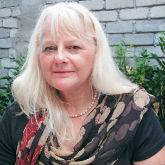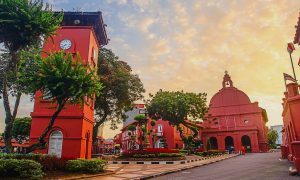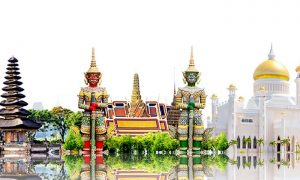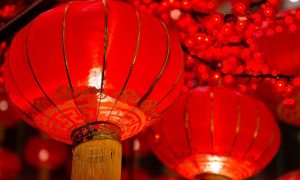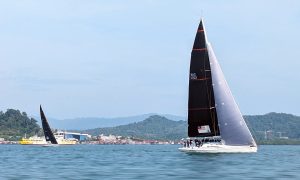Frances Wilks has spent ten years of her life in Penang, albeit divided into two time zones fifty years apart. Here she muses on what’s changed and what remains the same in the Pearl of the Orient.
One of my earliest memories of Penang is going to pick up my brother, who was at boarding school in England and was flying out from England for the summer holidays. In those days, travelling by air was much more expensive than going by sea (nowit’s the other way round), and most expat children were lucky to get a yearly flight.
We drove out to Bayan Lepas but, instead of the nearly finished sleek new airport, a simple airfield greeted us. My parents drove straight onto the grass runway as we waited for the tiny plane from Singapore to arrive. No customs or passport stamps or indeed any formalities. My brother walked down the aircraft steps, airsick and white from three days of flying from London to Rome then Cairo, Kararchi, Bombay and finally Singapore, where he had spent the night at the Raffles (there weren’t many other hotels in those days).
School Days
I, by contrast, went to school locally, although I was a weekly boarder and only returned home in time for lunch on Saturday. The Penang Hill Railway was very familiar to me and I remember getting off the train at Upper Tunnel Station and walking the three-quarters of a mile to the school on Monday mornings.
Nowadays, Uplands has its own campus in Batu Ferringhi, but in those days it was housed in the old buildings of the Crag Hotel, now sadly almost a complete ruin. I can remember the jungle cries as the sun set and the menacing dark night encroached on the isolated buildings. In those days, Uplands was one of the few international schools in Southeast Asia and children flew in from places as far away as Jakarta and Bangkok. Now there are at least seven international schools on Penang island alone.
Characters Of The City
Most of the expat life in the old days centred on clubs – in particular the Penang Swimming Club and the Penang Sports Club. The Swimming Club was whites only (a hangover from the colonial past) until my parents proposed the first non-European member, a great family friend, Dr. Robert Cheah, who was the Headmaster of the Penang Methodist School. This school was just round the corner from our old house, a government bungalow in Scotland Road. The school’s tuck shop used to be in a tatty old mansion which had seen better times. It is now the exquisitely restored Suffolk House and, despite the fact that it probably wasn’t built by Francis Light but slightly later, is one of the great monuments of the island’s history.
Dr. Robert Cheah’s mother, an immensely rich and dignified Chinese lady, lived in a vast house in Peel Avenue, now demolished, and her lodger on one of the upper floors was Sjovald Cunyngham Brown, one of the most flamboyant characters in the Penang of those days.
A former Malayan civil servant who was interned in Sumatra by the Japanese during World War Two, he had survived to become Penang’s last Resident Commissioner before independence. He was a mine of information about old Penang, its history, and its people. One of my most abiding memories is of his leading a group on a walk up Penang Hill to an abandoned house, called Highlands, and enjoying a picnic on the planter’s chairs which had been left on one of the decaying verandas. (I cannot find the house today, either it has been lost to the jungle or perhaps burnt down.) On the way back, we all swam naked in one of the Penang Water Board’s water tanks. It was so refreshing after a sweaty climb. I wouldn’t dare to do such a thing nowadays.
Life And Luxuries
Talking of swimming, we swam in the sea in those days, though there was danger from sea snakes, whose bite was invariably fatal. An antidote has now been discovered but they are no longer a problem. Instead the jelly fish are. My parents, who had survived the Blitz, took a dim view of “Health and Safety”. They choose to take the risk of being bitten by a sea snake and enjoy life. Batu Ferringhi was a beautiful clean beach in those days, and I spent many late afternoons watching the fishermen bring in their catches as the sun went down.
My mother shopped at Cold Storage, not the present day store in Island Plaza, but the old building in Penang Road. She also went to the markets to buy fresh fruit and vegetables, much as we do today. She painted Kedah Peak (now called Gunung Jerai), the great brooding mountain range sticking up like elongated knuckles on a giant’s hand just across the straits. She sat on the white sands of the beach at Gurney Drive with her oil paints and canvas. It’s almost unbelievable now, as this stretch of coastline has become rather a smelly marsh land, sparsely colonised by mangrove trees, since the land reclamation at the nearby Straits Quay altered the tidal patterns.
Then And Now
Traffic wasn’t such a problem as it is now, as few people could afford a car and so they rode bicycles or took the bus. People looked different in those days as well: Malay women wore sarongs and little cotton jackets with their dark hair slicked backed into elegant buns, Indian ladies wore saris, and Chinese wore Western dress and chongsams in the evening. Air-conditioning was very rare in houses, and completely non-existent in cars, and so to avoid a complete meltdown everyone had to wear cotton or linen, and most carried a fan to cool themselves.
But some things haven’t changed. Penang people are still, for the most part, friendly and warm-hearted, and tremendously accepting of foreigners. It’s an immigrant city after all, and perhaps that’s why expats feel so at home here.
———————————————————————————————————
Source: The Expat June 2013
What are your thoughts on this article? Let us know by commenting below.No registration needed.
"ExpatGo welcomes and encourages comments, input, and divergent opinions. However, we kindly request that you use suitable language in your comments, and refrain from any sort of personal attack, hate speech, or disparaging rhetoric. Comments not in line with this are subject to removal from the site. "

